Top 10 Mobile Cloud Hosting Providers
Mobile cloud hosting has witnessed considerable development in the last few years with the advent of new technology. Currently, many providers offer ample resources and features to help developers create agile and high-performance apps.
Making the right choice can be crucial for your business. Take a deeper look into mobile cloud hosting and the top providers below.
Contents
- 1 What is Mobile Cloud Hosting
- 2 Benefits of a Mobile Cloud Hosting
- 3 Top 10 Mobile Cloud Hosting Companies
- 4 1. Back4app
- 5 2. Firebase
- 6 3. AWS Amplify
- 7 4. Digital Ocean
- 8 5. AWS
- 9 6. Backendless
- 10 7. Linode
- 11 8. Vultr
- 12 9. Google Cloud
- 13 10. Heroku
- 14 Conclusion
- 15 FAQ
- 16 What is mobile cloud hosting?
- 17 What are the benefits of mobile cloud hosting?
- 18 What are the best mobile cloud hosting providers?
What is Mobile Cloud Hosting
Mobile cloud hosting refers to an IaaS, PaaS, or BaaS cloud delivery solution that offers a selection of virtual services to users. They get access to on-demand resources hosted atop cloud computing infrastructure.
Cloud hosting involves using components such as network, virtual hardware, and storage provided by a cloud computing service provider. Cloud companies make use of virtualization to provide hosting, meaning that data center infrastructure is provided to multiple users at the same time.
Benefits of a Mobile Cloud Hosting
- Very easy to scale resources
Cloud hosting enables the effortless scaling of server resources. Most cloud server providers offer easy-to-use dashboards for managing websites and monitoring real-time performance. Server resources can either be scaled up or down based instantly without needing to contact a hosting company.
- Redundant servers environment
Conventional hosting generally keeps a website’s resources on a server, but that is not ideal anymore with technological advancements. Now, it does not make sense for a website to go offline when the server malfunctions.
Redundant mobile cloud hosting solves this problem by offering site backups that can be brought into action if and when a server goes down. This type of hosting ensures fast reloading of a secondary live website version.
- High uptime and availability
Conventional hosting can also be disadvantageous as a website’s uptime can get compromised when a server goes offline. It is true in most cases except when a CDN is being used.
With mobile cloud hosting, all issues of availability and uptime are solved. Users can get access to high uptime by default if they use a reliable cloud service. Cloud hosting helps apps run virtually by fetching resources from multiple servers.
It ensures the swift transfer from one server to another if one is malfunctioning or has gone offline. Users can also perform on-demand resource scaling to make sure that their website stays online when traffic spikes happen.
Top 10 Mobile Cloud Hosting Companies
Here is a list with the best ten mobile cloud hosting platforms.
| Provider | Category | |
| 1 | Back4app | Backend as a Service |
| 2 | Firebase | Backend as a Service |
| 3 | AWS Amplify | Backend as a Service |
| 4 | Digital Ocean | Infrastructure as a Service |
| 5 | AWS | Infrastructure as a Service |
| 6 | Backendless | Backend as a Service |
| 7 | Linode | Infrastructure as a Service |
| 8 | Vultr | Infrastructure as a Service |
| 9 | Google Cloud | Infrastructure as a Service |
| 10 | Heroku | Platform as a Service |
Ready to know more? Keep reading below.
1. Back4app
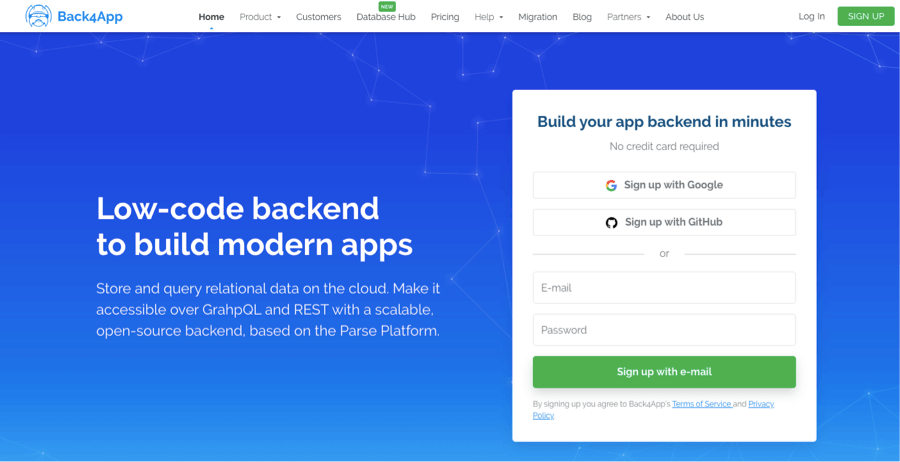
Back4App is a BaaS offering built on top open-source technologies. Users get optimal scalability and reliability with this backend offering. Back4App enables developers to perform effortless development, management, and hosting of applications. It is a top choice for hosting mobile, web, and Internet of Things applications.
Features
- Back4App comes with a feature-rich database for app development, synchronization and update.
- Its users can opt to use both GraphQL and REST APIs for development projects.
- Live Queries is a feature that enables users to rely on queries to effortlessly handle real-time data management.
- Back4App provides scalable hosting plans to let users perform easy and hassle-free scaling when requirements change.
Pricing
- Free – Back4App Free is a plan for users that want to test out its basic features and have simple development needs. It comes with 1 Gb transfer and storage, 10k requests and a 250 Mb database.
- Shared – Shared is a plan that has features like daily back-up and recovery, 24×7 monitoring, auto-scaling and multiple regions. It is priced between $5 to $100/month.
- Dedicated – The Back4App Dedicated plan gives users the options of dedicated VMS, 24×7 monitoring, multiple cloud access and enhanced security features. Users can opt for the Dedicated Silver and Dedicated Gold plans for $250 and $400 respectively.
2. Firebase
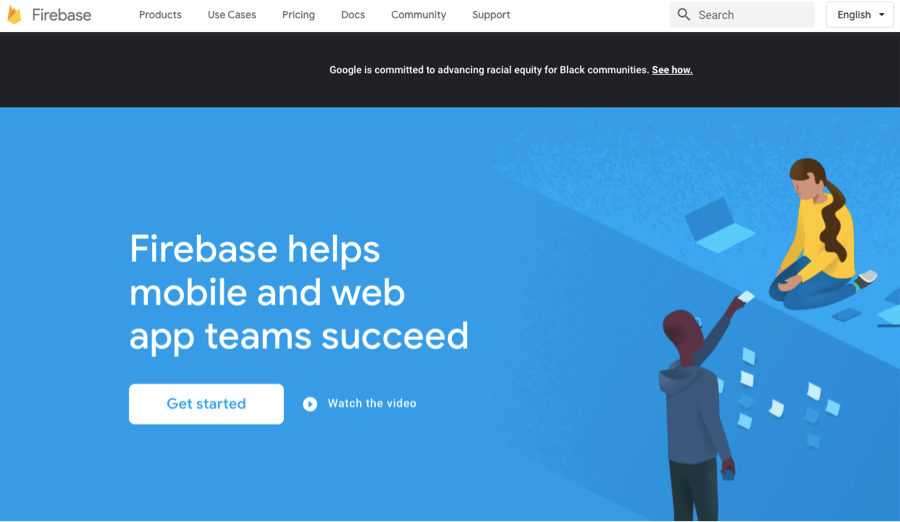
Firebase is a very popular BaaS option with a wide array of backend features and provides multiple APIs to users. It is a NoSQL database that relies on the JSON protocol for storing application data.
Firebase offers a high level of usability and scalability to users, making API development an easier task. Users of this platform also get access to many convenient backend customization features.
Features
- Cloud Firestore – Cloud Firestore is an offering of the Firebase platform. This cloud database is relied upon for storing and syncing data during development. It aids in helping developers perform swift and hassle-free mobile, web and server development, along with data syncing across applications. Firestore can be integrated with Google Cloud and Firebase.
- Real-time Database – Real-time data synchronization and storage is easy with the NoSQL database functionality of Firebase. Its database can easily be accessed by users when applications are offline.The Firebase real-time database performs JSON data storage, and enables data syncing across different clients.
- Machine Learning – Machine Learning or ML is a feature segment that provides various machine learning features for developers to facilitate greater real-world control. The ML Android and iOS kits gives users access to Google Machine Learning Features.
Pricing
- Spark Plan – The Spark Plan comes with 10 GB hosting, multiple sites, custom domain, SSL and many other features. Users get access to popular features like Real-time Database, Cloud Firestore, Test Lab, Firebase ML, storage, and authentication.
- Blaze Plan – Firebase Blaze is a pay-as-you-go pricing model that comes with all Spark plan features and additional ones. Blaze plan users get access to hosting for $0.026/GB and $0.026/GB hosting. There are no limitations and it is a suitable plan for businesses at all levels. Users can rely on the Firebase Blaze Plan Calculator to get pricing estimates.
3. AWS Amplify
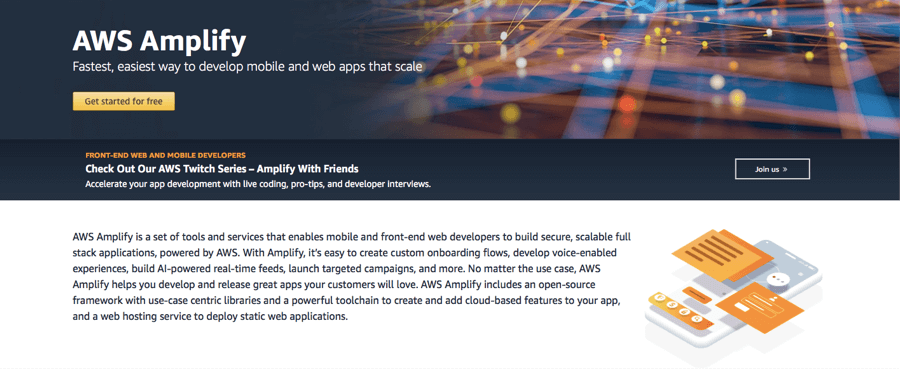
AWS Amplify is Amazon’s backend with a vast range of features for helping developers achieve fast and problem-free development.
This platform is suitable for meeting mobile and frontend application development requirements. AWS Amplify can create targeted campaigns; AI feeds, voice-based offerings, and onboarding flows.
Features
- Analytics is a feature that lets application owners get a full overview and lets them observe user behavior traits. It comes with features like auto-tracking and advanced metrics.
- Push notifications help AWS Amplify users improve application user engagement.
- AWS Amplify’s on-device storage comes with convenient user-sync features.
Pricing
- Free Tier – AWS Amplify’s Free Tier offers users 15 GB monthly hosting and 5 GB monthly storage, along with 1000 monthly build minutes.
- Pay as you go – AWS Amplify’s pay-as-you-go pricing offers hosting at $0.15/GB, monthly storage at $0.023/GB and $0.01/build minutes.
4. Digital Ocean
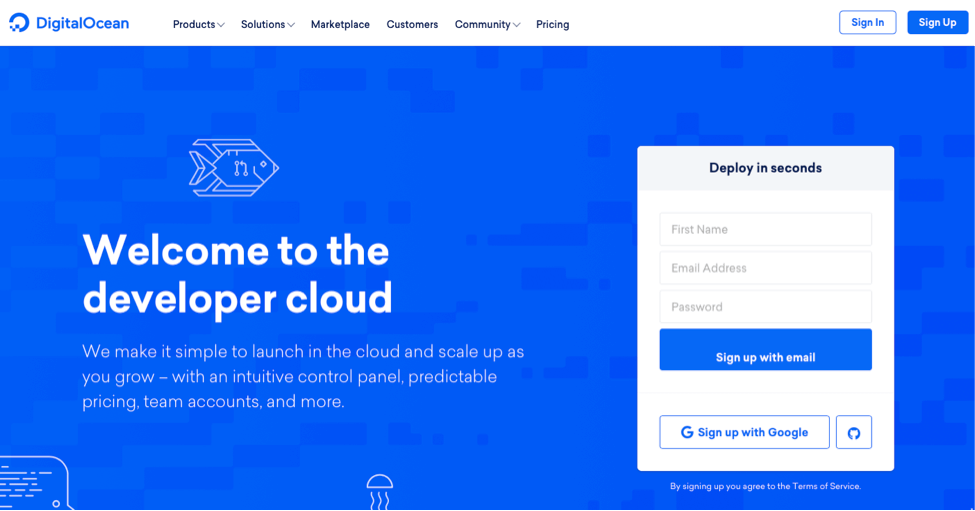
Digital Ocean is a widely relied-upon cloud service offering with a host of convenient IaaS features. It is widely used for website and app hosting and is known to offer a high usability degree.
The company’s data centers are capable of providing optimal security for applications and data. Digital Ocean offers VPS (Virtual Private Servers) to users as Droplets. The platform’s users can perform easy application management by using a doctl command line or a web-based UI.
Features
- Droplets – Digital Ocean Droplets are Linux-based virtual machines that run atop virtualized systems. The platform lets users create as many Droplets as they require depending on requirements. Droplets can be used as standalone units or as cloud infrastructure integrations.
- Block Storage – Digital Ocean Block Storage is the convenient storage feature of the platform. It lets users perform fast scaling for large applications. Using Block Storage lets developers perform resizing to a limit of 16TB.
- Backups – Backups are automatically-generated disk images of Digital Ocean Droplets. Users can set up weekly backups to let users go back to past app states with ease.
Pricing
Digital Ocean monthly pricing is determined by the number of virtual CPUs needed by a user. Plans begin at $5/month and the rate goes up based on factors such as memory caps, SSD size, vCPUs and transfer caps.
Users can choose from CPU-Optimized Droplets, Standard Droplets, Memory-Optimized Droplets, General Purpose Droplets, Managed Databases, and Spaces Object Storage.
5. AWS

AWS is the widely-used cloud platform of Amazon and a popular infrastructure as a service option for meeting development requirements. Users can also gain access to AWS SaaS and PaaS and sophisticated features such as machine learning, analytics, and AI.
Features
- AWS AMI – AWS AMI helps in deploying cloud instances of applications and functions as a cloud virtual machine.
- Amazon Aurora – Aurora is used for cloud relational database deployments to meet application requirements.
- AWS CodeDeploy – This feature facilitates Amazon services and on-premises application deployments.
- AWS AppSync – AppSync is AWS’s cloud-based offering for facilitating hassle-free web and mobile application updates.
Pricing
- Pay-as-you-go model – The AWS pay-as-you-go model helps users avail custom pricing to make sure they only pay for what they need.
- S3 Storage Pricing – AWS S3 Storage is free from any minimum fees and there are different plans for different parts of the world.
- EBS Pricing – AWS EBS pricing is a custom requirement-based pricing model where users pay only for what they need.
6. Backendless
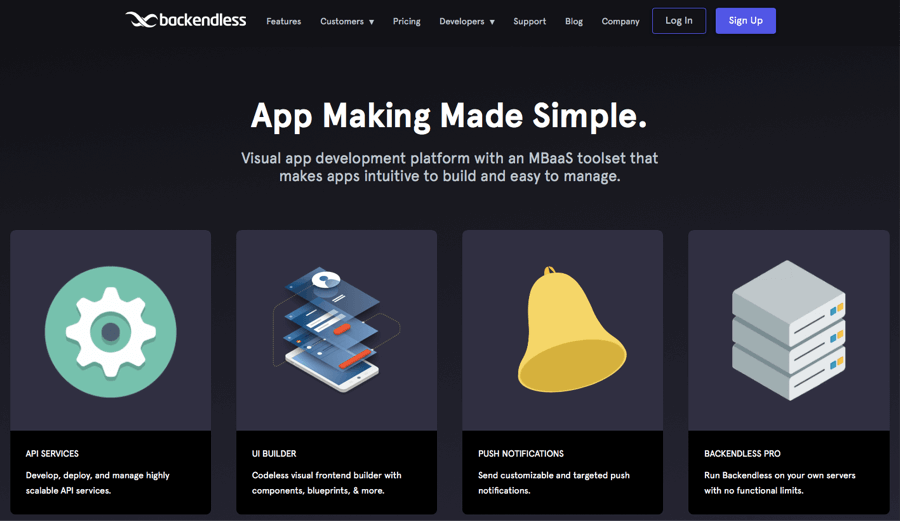
Backendless is a popular MBaaS platform offering various powerful features and tools to help users achieve fast and hassle-free development.
This open-source platform provides cloud-based, dedicated, and managed servers along with user-specified APIs.
Features
- Backendless features a database that offers support for both SQL and NoSQL.
- Backendless caching helps developers to optimize application agility and improves functionality.
- The provider enhances application efficiency with centralized log management.
- Geolocation is a feature that enables developers create applications with location awareness and geofencing.
Pricing
- Backendless Cloud – Backendless Cloud comes with convenient features like API calls, database tables, scaling, and push notifications. Getting started is free but prices can go up to $25 every month.
- Backendless Pro – The Pro plan of Backendless enables access and use of the platform from private data centers, public cloud and computer.
- Managed Backendless – Managed Backendless is a plan with customizable pricing. It is free from any limitations and provides uptime guarantee to users.
7. Linode

Linode is a web-hosting service that offers VPS cloud hosting plans through Linux servers. It has an array of tools to help users compute, store and network with ease, along with a convenient marketplace.
Linode is built for businesses that want to take advantage of cloud computing to meet their objectives. It boasts nine global data centers across three regions.
Features
- Kubernetes – Linode Kubernetes Engine or LKE is a feature that helps developers deploy and manage container apps and workloads.
- Shared Instances – The Shared Instances feature offers many resources that users can fetch during cloud computing app development projects.
- Dedicated CPU – Linode’s Dedicated CPU helps to enhance the performance of resource-intensive apps. It is a convenient feature that helps Linode stand out from its competitors.
- Block Storage – Block Storage is useful for letting users improve the storage capabilities of Linode servers. Users can rely on this to retain data if Linode is deleted.
Linode Pricing
- Shared Plans – Linode Shared plans offer VMs with different levels of performance, storage and CPU cores. Shared Plan pricing is in the range of $5 – $960 per month.
- Dedicated Plans – Linode Dedicated Plans are the right matches for CPU-intensive applications that require large resource volumes. Dedicated pricing is in the range of $30 to $3840 per month.
- Block Storage – Linode users can choose to buy Block Storage additionally to enhance server storage capabilities. The price for Block Storage ranges from $1 – $1024 per month for 10GB – 10240GB storage.
- Object Storage – Object Storage is an S3-compatible storage option priced between $5 – $1000 per month for 250GB – 50TB storage.
8. Vultr
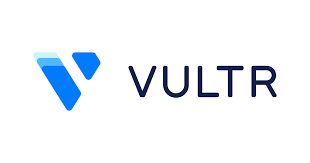
Vultr offers SSD cloud servers situated across the globe. It also has a reliable hosting service for developers. Vultr uses can make use of a standard platform and SSDs, and choose from multiple locations.
Features
- Vultr Data Centers – The company offers secure data centers across 15 locations globally.
- Dedicated IP Addresses – Vultr users can opt for customizable dedicated IPs. Their servers run on Intel cores and are quite reliable.
- Custom control panel – Vultr’s custom control panel facilitates easy feature installations to free up developers so they can focus on core development.
Pricing
- Cloud Compute – It starts from $2.50/month and goes up to $640/month, offering 10 – 1600 GB storage space and memory upto 96 GB.
- Bare Metal – Bare Metal provides 5000GB bandwidth, 8 cores and more at a rate of $120/month.
- Dedicated Cloud – Prices range between $60 to $240 per month, offering between 120 GB to 480 GB storage.
- Load Balancers – Load Balancers are available at a rate of $10 per month.
9. Google Cloud
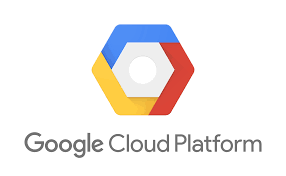
Google Cloud is the cloud computing suite of tech giant Google and comes with many features for developers.
It facilitates hassle-free development of applications, provides robust security, and provides collaborative development features.
Features
- App Engine – It is a PaaS offering to deploy apps written in Java, Python, Ruby, Node.js, Go and C#.
- Cloud Functions – Cloud Functions refers to a service offering to help run event-based Python, Node.js, Python and Go code.
- Cloud SQL – It is a database as a service for Google Cloud users, based on MySQL, Microsoft SQL Server and PostgreSQL.
Pricing
Users can start for free and request Google for a quote. The Pricing Calculator helps you get an estimate.
10. Heroku
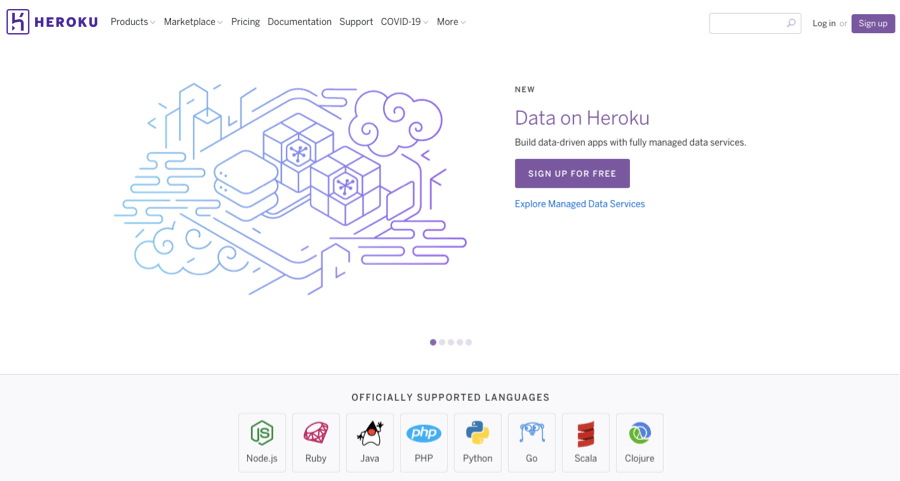
Heroku is a PaaS offering that helps developers perform effortless app development and deployment, management, and scaling.
This platform supports many widely-used programming languages like Ruby, Python, PHP, Java, Clojure, Node.js, and Scala.
Features
- Heroku DX – Heroku DX is an app-driven system that lets developers lay a strong focus on application development and deployment.
- Heroku runtime – Heroku runs apps through containers called Dynos. The provider offers a fully managed runtime, with support for multiple languages.
- Heroku OpEx – OpEx lets developers identify and solve application issues. They can also modify flows with this feature.
Pricing
- Free and Hobby – Free and Hobby is a starter plan suitable for the deployment of non-commercial applications.
- Production – Production is a plan that starts from $25/month. Pricing can vary based on changing requirements.
- Advanced – The Advanced Plan starts at $250/month. It is suitable for users that require advanced development features.
- Enterprise – Heroku Enterprise is a pay-as-you-go plan, most well-suited for enterprise clients that require the highest level of security.
Conclusion
The mobile cloud hosting providers mentioned above are all worth considering. Compare the features and pricing of each to make the right choice.
FAQ
What are the benefits of mobile cloud hosting?
– Very easy to scale
– Redundant server environment
– High uptime and availablity
What are the best mobile cloud hosting providers?
– Back4app
– Firebase
– AWS Amplify
– Digital Ocean
– AWS
– Linode
– Vultr
– Backendless
– Google Cloud
– Heroku



